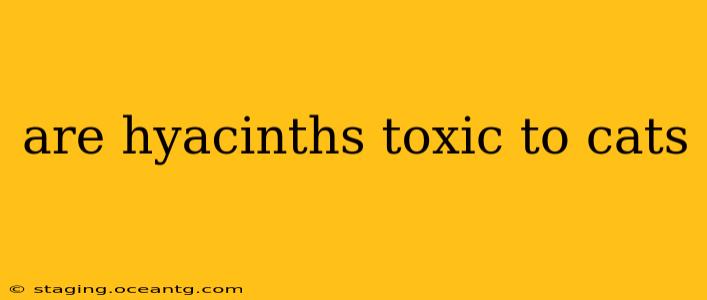Hyacinths, with their vibrant colors and intoxicating fragrance, are a popular spring bloom. However, if you're a cat owner, you need to be aware that these beautiful flowers pose a potential threat to your feline friend. Yes, hyacinths are toxic to cats. All parts of the plant – the bulbs, leaves, stems, and flowers – contain toxins that can cause serious health problems if ingested.
This article will delve deeper into the toxicity of hyacinths for cats, exploring the specific toxins involved, the symptoms of poisoning, and what to do if your cat ingests any part of the plant. We'll also answer some frequently asked questions pet owners often have about hyacinth toxicity.
What Toxins Do Hyacinths Contain?
Hyacinths contain calcium oxalate crystals, which are the primary cause of toxicity in cats. These crystals irritate the mouth, throat, and digestive system, causing a range of unpleasant symptoms. The concentration of these crystals varies depending on the part of the plant, with the bulbs generally containing the highest concentration.
What are the Symptoms of Hyacinth Poisoning in Cats?
If your cat ingests part of a hyacinth plant, you might observe some or all of the following symptoms:
- Oral Irritation: Excessive drooling, pawing at the mouth, and difficulty swallowing are common initial signs.
- Gastrointestinal Upset: Vomiting and diarrhea are frequent occurrences.
- Loss of Appetite: Your cat may refuse food.
- Depression and Lethargy: Your cat may appear unusually sluggish or withdrawn.
- In more severe cases: More serious complications can arise including difficulty breathing, tremors, and even death, though this is less common.
How Can I Prevent My Cat from Eating Hyacinths?
Prevention is key when it comes to pet safety. Here are some crucial steps to take:
- Keep Hyacinths Out of Reach: Place hyacinth plants in areas inaccessible to your cat, ideally in a room your cat doesn't frequently visit. Consider hanging baskets or placing them on high shelves.
- Supervise Your Cat: Especially when introducing new plants to your home, keep a close eye on your cat's behavior.
- Choose Cat-Friendly Alternatives: Opt for plants known to be non-toxic to cats, such as catnip, spider plants, or African violets. There are many beautiful and safe options available.
- Securely Contain Bulbs: If planting hyacinth bulbs outdoors, ensure they are deeply buried and the area is well-protected from digging cats.
What Should I Do if My Cat Eats a Hyacinth?
If you suspect your cat has ingested any part of a hyacinth plant, immediate action is crucial.
- Contact Your Veterinarian or Animal Poison Control: Don't delay; getting expert advice is paramount. They can guide you on the best course of action based on the amount ingested and your cat's condition.
- Gather Information: Try to determine how much of the plant your cat ate and what part of the plant it was. This information will be helpful for your veterinarian.
- Follow Veterinary Instructions: Your vet will likely provide specific instructions, which may include inducing vomiting or administering supportive care.
Are all types of hyacinths toxic to cats?
Yes, all types of hyacinths are considered toxic to cats. There aren't any varieties that are safe for feline consumption.
What other plants are toxic to cats?
Many common household plants pose risks to cats. Lilies, tulips, daffodils, azaleas, and sago palms are just a few examples. It's always best to research the toxicity of any plant before bringing it into a home with cats.
How quickly will my cat show symptoms after eating a hyacinth?
Symptoms can appear relatively quickly, sometimes within minutes to hours of ingestion. However, the onset and severity of symptoms can vary depending on factors such as the amount of plant consumed and your cat's individual sensitivity.
By understanding the risks associated with hyacinths and taking preventative measures, you can ensure the safety and well-being of your beloved feline companion. Remember, if you have any concerns about your cat's health, always consult with a veterinarian immediately.
